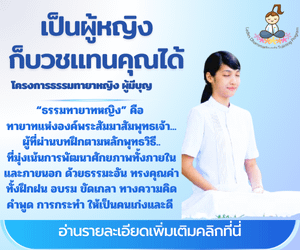มิจฉาทิฐฐิ คือ ความเห็นผิด ความเห็นคลาดเคลื่อนจากความเป็นจริง เป็นอุปสรรคสำคัญที่ขัดขวางการพัฒนาตนเองและนำไปสู่ความทุกข์ ในทางพระพุทธศาสนา มิจฉาทิฐฐิถือเป็นรากเหง้าของกิเลสทั้งปวง เปรียบเสมือนความมืดบอดที่ปิดกั้นไม่ให้มองเห็นความจริง บทความนี้จะพาคุณเจาะลึกถึงมิจฉาทิฐฐิ สาเหตุ โทษ และแนวทางในการแก้ไข เพื่อปลดปล่อยตนเองจากพันธนาการแห่งความหลงผิด
มิจฉาทิฐฐิ มีกี่ประเภท?
มิจฉาทิฐฐิ แบ่งออกเป็น 2 ประเภทหลักๆ คือ
1. มิจฉาทิฐฐิแบบโลกียะ คือ ความเห็นผิดในเรื่องทางโลก เช่น
- อัตตทิฐิ: ยึดมั่นถือมั่นว่ามีตัวตน
- สัสสตทิฐิ: เชื่อว่าโลกนี้เที่ยงแท้ถาวร
- อุจเฉททิฐิ: เชื่อว่าตายแล้วสูญ ไม่มีอะไรเหลือ
- อิศวรนิรมิตทิฐิ: เชื่อว่ามีผู้สร้างโลก
- ผีสางเทวดา: เชื่อในเรื่องงมงาย ไสยศาสตร์
2. มิจฉาทิฐฐิแบบโลกุตตระ คือ ความเห็นผิดในเรื่องทางธรรม เช่น
- ไม่เชื่อในกฎแห่งกรรม: คิดว่าทำอะไรก็ได้ ไม่มีผลตอบแทน
- ไม่เชื่อในพระพุทธ พระธรรม พระสงฆ์: ปฏิเสธคำสอนของพระพุทธเจ้า
- ไม่เชื่อในนิพพาน: ไม่เชื่อว่ามีการหลุดพ้นจากทุกข์
สาเหตุของมิจฉาทิฐฐิ
- การอบรมเลี้ยงดู: ได้รับการปลูกฝังความเชื่อที่ผิดๆ มาตั้งแต่เด็ก
- สภาพแวดล้อม: อิทธิพลจากสังคม วัฒนธรรม
- การศึกษา: ขาดการศึกษาหาความรู้ที่ถูกต้อง
- อคติ: ความลำเอียง ความยึดติดในความคิดของตนเอง
- ความไม่รู้: ไม่รู้จักพิจารณาไตร่ตรองด้วยปัญญา
โทษของมิจฉาทิฐฐิ
- เป็นบ่อเกิดแห่งความทุกข์: นำไปสู่การกระทำที่ผิดพลาด สร้างปัญหาให้กับตนเองและผู้อื่น
- เป็นอุปสรรคต่อการพัฒนาตนเอง: ปิดกั้นการเรียนรู้ ไม่เปิดรับสิ่งใหม่ๆ
- เป็นเหตุแห่งการเวียนว่ายตายเกิด: ทำให้ตกอยู่ในวัฏสงสาร ไม่สามารถหลุดพ้นจากทุกข์ได้
การแก้ไขมิจฉาทิฐฐิ
- ศึกษาพระธรรมคำสอน: เรียนรู้หลักธรรมคำสอนของพระพุทธเจ้า เพื่อให้เกิดปัญญาและความเข้าใจที่ถูกต้อง
- ฝึกฝนอบรมจิตใจ: เจริญสติ ฝึกสมาธิ เพื่อให้มีจิตใจที่清明
- พิจารณาไตร่ตรอง: ใช้ปัญญาพิจารณาสิ่งต่างๆ อย่างรอบคอบ
- เปิดใจรับฟัง: รับฟังความคิดเห็นของผู้อื่น
- ละทิ้งอคติ: ปล่อยวางความยึดมั่นถือมั่น
มิจฉาทิฐฐิ 10 ข้อ คือ ความเห็นผิดที่เป็นอุปสรรคต่อการพัฒนาตนเองและการหลุดพ้นจากทุกข์ มีดังนี้
- นัตถิ กัมมัง (ไม่เชื่อกรรม) ปฏิเสธกฎแห่งกรรม ไม่เชื่อว่าการกระทำใดๆ จะส่งผล
- นัตถิ วิปากัง (ไม่เชื่อผลของกรรม) ไม่เชื่อว่ากรรมดี กรรมชั่ว จะส่งผลให้ได้รับสุขหรือทุกข์
- นัตถิ ภะวัง (ไม่เชื่อภพ) ไม่เชื่อในการเวียนว่ายตายเกิด ไม่เชื่อว่ามีภพภูมิ
- นัตถิ สัตตัง (ไม่เชื่อสัตว์) ไม่เชื่อว่ามีสัตว์ มีแต่ร่างกายที่ประกอบขึ้นจากธาตุต่างๆ
- นัตถิ โลโก (ไม่เชื่อโลก) ไม่เชื่อว่ามีโลกนี้ โลกหน้า
- นัตถิ มาตา (ไม่เชื่อคุณของแม่) ไม่เห็นคุณค่าของมารดา ผู้ให้กำเนิดและเลี้ยงดู
- นัตถิ ปิตา (ไม่เชื่อคุณของพ่อ) ไม่เห็นคุณค่าของบิดา ผู้ให้กำเนิด อบรมสั่งสอน
- นัตถิ สัตตา โอปปาติกา (ไม่เชื่อสัตว์เกิดผุดขึ้น) ไม่เชื่อว่ามีสัตว์ที่เกิดขึ้นเอง เช่น เทวดา เปรต อสุรกาย
- นัตถิ โลเก สมณพราหมณา (ไม่เชื่อสมณพราหมณ์) ไม่เชื่อว่ามีนักบวชหรือผู้ทรงศีล ผู้ปฏิบัติดี ปฏิบัติชอบ ที่สามารถชี้แนะแนวทางสู่ความหลุดพ้นได้
มิจฉาทิฐฐิ เป็นมารที่คอยขัดขวางการพัฒนาจิตใจ การปลดปล่อยตนเองจากมิจฉาทิฐฐิ จึงเป็น langkah สำคัญในการก้าวสู่เส้นทางแห่งความดีงาม และบรรลุถึงความสุขที่แท้จริง
Miccha Ditthi The Dangers of Wrong View
Miccha Ditthi, or Wrong View, refers to incorrect or distorted perceptions of reality. It’s a significant obstacle to personal growth and a major source of suffering. In Buddhism, Wrong View is considered the root of all defilements, a blindness that prevents us from seeing the truth. This article delves into the nature of Miccha Ditthi, its causes, consequences, and potential remedies to free ourselves from its grip.
Types of Miccha Ditthi
Miccha Ditthi can be broadly categorized into two main types:
1. Worldly Wrong Views (Lokiya Miccha Ditthi): These are misconceptions about the world, such as:
- Self-view (Atta Ditthi): Clinging to the idea of a permanent, unchanging self.
- Eternalism (Sassata Ditthi): Believing that the world or the self is eternal and unchanging.
- Annihilationism (Uccheda Ditthi): Believing that death is the end of existence, with no rebirth or continuation.
- Creationism (Issaranimmana Ditthi): Believing in a creator god responsible for the universe.
- Superstition: Belief in supernatural beings, spirits, and the efficacy of rituals and charms.
2. Supramundane Wrong Views (Lokuttara Miccha Ditthi): These are misconceptions about the spiritual path and ultimate reality, such as:
- Denial of Kamma: Rejecting the law of cause and effect, believing actions have no consequences.
- Denial of the Triple Gem: Disbelieving in the Buddha, the Dharma (his teachings), and the Sangha (the monastic community).
- Denial of Nibbana: Not believing in the possibility of liberation from suffering.
Causes of Miccha Ditthi
- Upbringing and Conditioning: Being raised with incorrect beliefs and values.
- Social and Cultural Influences: Exposure to prevailing societal norms and cultural biases.
- Lack of Education: Insufficient knowledge and understanding of Buddhist teachings.
- Prejudice and Bias: Closed-mindedness and clinging to personal opinions.
- Ignorance: Lack of critical thinking and self-reflection.
Consequences of Miccha Ditthi
- Leads to Suffering: Results in unwise actions, creating problems for oneself and others.
- Hinders Personal Growth: Blocks learning and prevents open-mindedness to new ideas.
- Perpetuates the Cycle of Rebirth: Keeps one trapped in the cycle of suffering (samsara).
Overcoming Miccha Ditthi
- Study Buddhist Teachings: Learn and understand the Dharma to gain wisdom and insight.
- Cultivate Mental Discipline: Practice mindfulness and meditation to develop a clear and focused mind.
- Engage in Critical Thinking: Reflect and analyze information carefully.
- Be Open-minded: Listen to different perspectives and be willing to challenge your own beliefs.
- Abandon Prejudice: Let go of attachments and biases.
The 10 Miccha Ditthis (Wrong Views) are fundamental misconceptions that hinder spiritual progress and liberation from suffering. They are:
- Natthi Kammaṃ: Denial of Kamma (action). Rejecting the law of cause and effect, believing that actions have no consequences.
- Natthi Vipākaṃ: Denial of the Results of Kamma. Not believing that good or bad actions lead to corresponding happy or unhappy results.
- Natthi Bhavaṃ: Denial of Rebirth. Disbelieving in the cycle of birth and death and the existence of different realms of existence.
- Natthi Sattaṃ: Denial of Sentient Beings. Not believing in the existence of living beings, seeing only a collection of physical elements.
- Natthi Lokaṃ: Denial of the World. Denying the existence of this world and other worlds.
- Natthi Mātā: Denial of the Mother’s Goodness. Not recognizing the value and kindness of one’s mother.
- Natthi Pitā: Denial of the Father’s Goodness. Not recognizing the value and kindness of one’s father.
- Natthi Sattā Opapātikā: Denial of Spontaneous Rebirth. Not believing in the existence of beings who are spontaneously reborn, such as devas (gods) and petas (hungry ghosts).
- Natthi Loke Samaṇabrāhmaṇā: Denial of Ascetics and Brahmins. Not believing in the existence of virtuous and wise ascetics or holy persons who can guide others towards liberation.
- Natthi Loke Samaṇabrāhmaṇā Sammākhatā Sammāpaṭipannā Ye Imañca Lokaṃ Parañca Lokaṃ Sayaṃ Abhiññā Sacchikatvā Pavedeṃti: Denial of Enlightened Beings. Not believing in the existence of enlightened beings who have realized the truth and can teach others the path to liberation.
Miccha Ditthi is a formidable obstacle on the path to spiritual progress. Overcoming Wrong View is crucial for cultivating wholesome qualities and attaining true happiness and liberation.


















